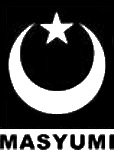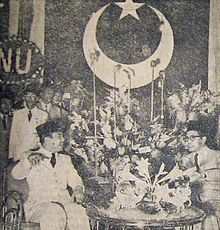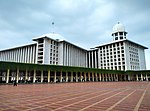Masyumi Party
Council of Indonesian Muslim Associations Partai Majelis Syuro Muslimin Indonesia | |
|---|---|
 | |
| Abbreviation | Masyumi |
| Chairman | Hasyim Asyari (first) Soekiman Wirjosandjojo Mohammad Natsir |
| Secretary-General | Various |
| Founded | 24 October 1943 (organization) 7 November 1945 (party) |
| Dissolved | 13 September 1960 |
| Merger of | Nahdlatul Ulama Muhammadiyah Persatuan Islam Perikatan Umat Islam |
| Preceded by | Majelis Islam A'la Indonesia |
| Succeeded by | Crescent Star Family (later became Crescent Star Party) |
| Headquarters | Djakarta, Indonesia |
| Newspaper | Abadi |
| Membership (1950) | 10 million [1] |
| Ideology | Pan-Islamism |
| Religion | Islam |
Masyumi Party (Indonesian: Partai Majelis Syuro Muslimin Indonesia) (Council of Indonesian Muslim Associations) was a major Islamic political party in Indonesia during the Liberal Democracy Era in Indonesia. It was banned in 1960 by President Sukarno for supporting the PRRI rebellion.
Masyumi was the name given to an organization established by the occupying Japanese in 1943 in an attempt to control Islam in Indonesia.[2] Following the Indonesian Declaration of Independence, on 7 November 1945 a new organization called Masyumi was formed. In less than a year it became the largest political party in Indonesia. It included the Islamic organizations such as Nahdlatul Ulama and Muhammadiyah. During the period of liberal democracy era, Masyumi members had seats in the People's Representative Council and the party supplied prime ministers such as Muhammad Natsir and Burhanuddin Harahap.[3]

Masyumi came second in the 1955 election. It won 7,903,886 votes, representing 20.9% of the popular vote,[4] resulting in 57 seats in parliament. Masyumi was popular in modernist Islamic regions such as West Sumatra, Jakarta, and Aceh. 51.3% of Masyumi's vote came from Java, but Masyumi was the dominant party for regions outside Java, and it established itself as the leading party for the one third of people living outside Java.[5][6]
In 1958, some Masyumi members joined the PRRI rebellion against Sukarno. As a result, in 1960 Masyumi (and the Socialist Party) were banned.[7]
Following the banning, Masyumi members and followers established the Crescent Star Family (Indonesian: Keluarga Bulan Bintang) to campaign for Islamic shariah law and teachings. An attempt was made to reestablish the party following the transition to the New Order, but this was not permitted. After the fall of Suharto in 1998, another attempt was made to revive the party name, but eventually Masyumi followers and others established the Crescent Star Party, which contested the legislative elections in 1999, 2004 and 2009.[8]
Notes
References
- Bambang Setiawan & Bestian Nainggolan (Eds) (2004) 'Partai-Partai Politik Indonesia: Ideologi dan Program 2004-2009 (Indonesian Political Parties: Ideologies and Programs 2004-2009 Kompas (1999) ISBN 978-979-709-121-7 Indonesian
- Feith, Herbert (2007) The Decline of Constitutional Democracy in Indonesia Equinox Publishing (Asia) Pte Ltd, ISBN 978-979-3780-45-0
- Ricklefs, M.C. (1991). A history of modern Indonesia since c.1200. Stanford: Stanford University Press. ISBN 978-0-8047-4480-5
- Simanjuntak, P.H.H (2003) Kabinet-Kabinet Republik Indonesia: Dari Awal Kemerdekaan Sampai Reformasi (Cabinets of the Republic of Indonesia: From the Start of Independence to the Reform era, Penerbit Djambatan, Jakarta, ISBN 978-979-428-499-5
- Feith, Herbert (1999) Pemilihan Umum 1955 di Indonesia (Translated from The Indonesian Elections of 1955) Kepustakaan Popular Gramedia ISBN 978-979-9023-26-1
See also
- 1943 establishments in the Dutch East Indies
- 1945 establishments in Indonesia
- 1960 disestablishments in Indonesia
- Defunct political parties in Indonesia
- Islamic political parties in Indonesia
- Islamism in Indonesia
- Organizations established in 1943
- Pan-Islamism
- Political parties disestablished in 1960
- Political parties established in 1945

